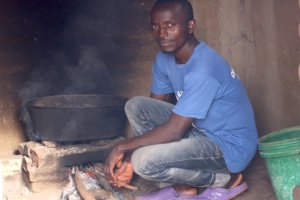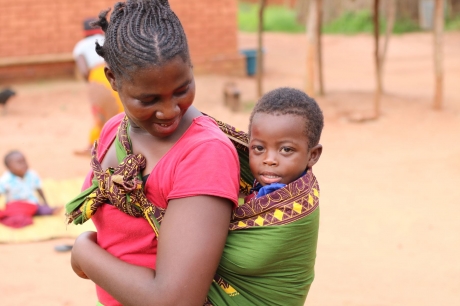
Tael has benefitted from an energy-saving stove supplied as part of a FAO project. ©FAO/Towela Munthali
Mzuzu: On the outskirts of Mzuzu city in Malawi, in the small village of Chikoya, lives Tael Vumu. His day job is farming, but on the side, he’s a local food hero, tirelessly volunteering to improve his household’s nutrition and boost the health of his entire community.
He does so through the European Union-funded Afikepo nutrition-sensitive agriculture project, implemented by FAO, UNICEF and the Government of Malawi. Afikepo means ‘Let them [the children] develop to their full potential’ in Malawi’s Chichewa language, and it is this that the nutrition programme seeks to do. It is designed to improve and diversify diets for women of childbearing age, adolescent girls, infants and young children in Malawi.
The FAO-UNICEF project works through care groups, which are made up of volunteers, community leaders, called cluster leaders, who attend meetings, learn about nutrition and then share that knowledge with other households in their communities.
It’s not ‘women’s work’
Having a child under five years old, Tael was initially supported by the project but swiftly took up a leadership role, becoming a cluster leader and member of Titemwane care group and supporting different 12 households.
Tael talks with pride about the importance of men’s participation when it comes to activities that contribute to good nutrition in the home. According to Tael, most circles of society in Malawi consider food preparation and nutrition to be a ‘woman’s domain’. He fervently disagrees, insisting that nutrition security in the home is a responsibility that men should embrace too.
Also read: Young people are reconnecting to ancestral food systems

“If I am responsible for taking care of my children’s needs and wellbeing, then one of my tasks should be to ensure that my family adopts practices for good nutrition, whether in agriculture, or hygiene, or even bringing in money for buying supplementary food items which we cannot produce,” Tael says.
Sharing is caring
At care group meetings, Tael and his fellow leaders attend meetings where they share recipes and nutritious food combinations. They also take part in lessons on how to be “nutrition-sensitive” in crop and livestock production, covering topics like optimal nutrition for expectant mothers, infants and young children, food preservation and hygiene.
“Through the care group meetings, we learn and remind each other of the importance of consuming the different food groups and diversified agricultural production,” Tael says.
With seeds and inputs provided by the project, Tael has used his knowledge to grow yellow maize, orange fresh sweet potatoes, soya beans, fortified kidney beans and other nutrient-dense crops.
Tael and the other leaders then pass this knowledge on to the households they support, who become involved in activities themselves. For example, each household now has a backyard garden with fruit trees, which the project provided to ensure the availability and accessibility of fruits and vegetables.

The Afikepo project also provided Tael’s care group with five rabbits and support in constructing a coop. These rabbits have bred, and the care group members have started a ‘pass-on’ initiative to provide pregnant and breastfeeding women or children under the age of five with access to animal-sourced protein. Eighteen other households have now received two rabbits each, so that they too can breed them to pass on to others.
“We were used to rearing chickens and not rabbits, but…we realised that rabbits actually reproduce at a faster rate than chickens,” Tael says.
Better household practices
The Afikepo project also provided the community with knowledge to improve household practices making them more efficient and hygienic. These improvements included the construction of drying racks for kitchen utensils and hygienic toilets with soap and water for handwashing after use. For Tael, the improvements to hygiene practices have been invaluable for the health of his family.
To help with efficiency, the project introduced households to energy-saving stoves that use less firewood. This means that family members save time in fetching wood and that there is less pressure on neighbouring woodlots.
“The kitchen was an empty room where we cooked on an open fire. It required a lot of firewood, which ran out quickly. We were contributing to the destruction of the environment,” says Tael’s wife, Mary Phiri. “But because Afikepo has provided us with skills to construct energy-saving stoves, you find that we use perhaps two small logs, and the food is ready and this, in a short space of time since the stove retains heat.”
Visible change
When asked what inspired him to become a cluster leader, Tael says that initially, his sister had the role. When she moved away there was no one else to take on the responsibility, so he stepped in.
“I was inspired by the visible changes that I saw the project was bringing and got encouraged to take up the lead role so that I could inspire others to take part in nutrition activities and be a part of bringing change to our community,” he says with enthusiasm.
Now Tael and his wife run a model home, a learning centre where community members come to see how they too can improve their household’s nutrition. Tael and Mary are real food heroes, a true example of how two people are transforming an entire community.
Source: the FAO News and Media office
– global bihari bureau





